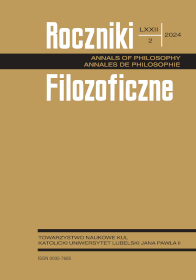Arystoteles, Tomasz z Akwinu, Jan Duns Szkot: Kilka uwag o różnicy między starożytnym i średniowiecznym pojmowaniem cnoty
Aristotle, Thomas Aquinas, John Duns Scotus: A Few Comments on the Difference Between the Ancient and the Medieval Understanding of Virtue
Author(s): Martyna KoszkałoSubject(s): Philosophy, History of Philosophy, Ancient Philosphy, Philosophy of Middle Ages
Published by: Towarzystwo Naukowe KUL & Katolicki Uniwersytet Lubelski Jana Pawła II
Keywords: Aristotle; Aquinas; John Duns Scotus; virtue; free will; magnanimous
Summary/Abstract: The article presents the Greek ideal of a virtuous man presented in Aristotle's ethics in contrast to the equivalent of this ideal present in Christian culture (Thomas Aquinas, John Duns Scotus). Certain elements of Aristotle’s ethics aroused controversy, especially elitism and the megalópsychos model, and had to be transformed in Christian ethics. Due to the new anthropological model (man as a sinful being), the concept of virtue has undergone some modification, especially in voluntaristic trends, because a virtuous person, despite having a good character, is susceptible to fall. The article presents the concept of the causal relationship between virtue and free will, referring to the comments of Thomas Aquinas and John Duns Scotus. Since there is no place for libertarian free will in Aristotle’s ethics, his virtuous moral ideal is closed in its perfection. The difference between the perspective of Christian and Greek ethics is that in Christian ethics, subjectivity is realized more in the free acts of the subject than in practical rationality. Therefore, virtue cannot determine free will in a way that would deprive the will of freedom understood in a libertarian sense.
Journal: Roczniki Filozoficzne
- Issue Year: 72/2024
- Issue No: 2
- Page Range: 489-510
- Page Count: 22
- Language: Polish

